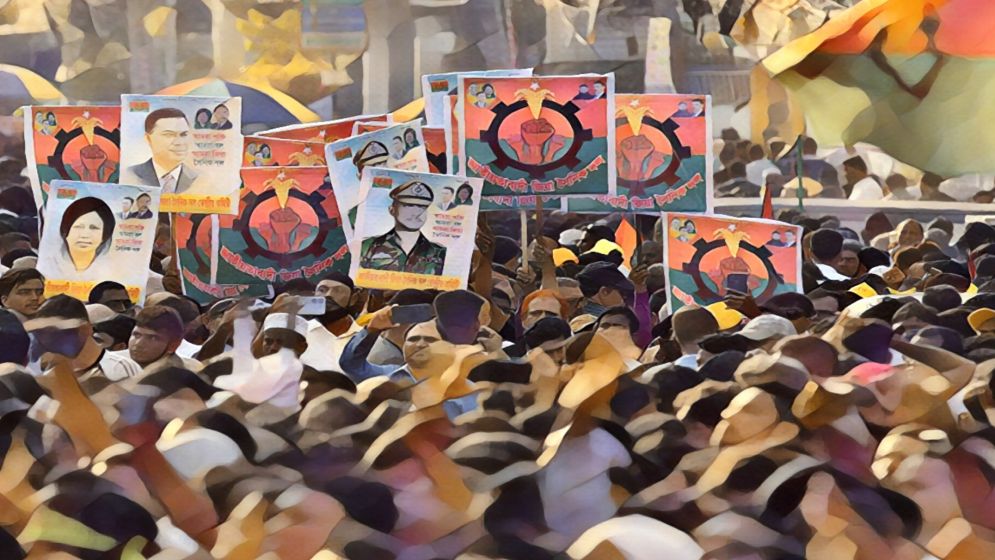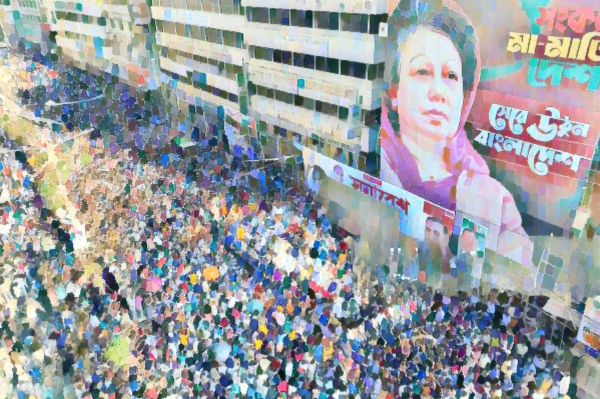The risk of extending BNP’s waiting game…

The student leaders who spearheaded the anti-fascism march in Bangladesh, perhaps due to their inexperience and lack of strategic foresight, made a series of critical missteps.
The first of these was their decision to distance themselves from the broad, non-partisan public that had originally supported them.
Leadership, at its core, depends on the ability to galvanize and sustain a diverse base of followers.
Yet, soon after the ousting of Hasina, these leaders turned away from the mass movement they had ignited, instead surrounding themselves with a select circle from Dhaka University and a few prominent figures from various factions.
This shift alienated the very people who had rallied behind them.
As a result, large segments of the population no longer saw themselves represented by either the student leaders or the government that emerged.
While the new government, formed through a coalition of disparate groups—military officials, the Bangladesh Nationalist Party (BNP), leftist factions, Chuppu, and Jamaat—may have appeared as a broad-based authority, it soon became associated with student leaders who, despite their promises, failed to deliver.
Meanwhile, India, Bangladesh's most significant foreign influence, maintained constant communication with the architects of the Yunus administration, further complicating the political landscape.
The resulting dynamic—where the student leadership has lost touch with the masses and the government it backs has proven ineffective—has created a ripe opportunity for the BNP.
In effect, BNP has come to dominate the political scene. With the removal of fascist elements from the bureaucracy and judiciary, the party has moved into the power vacuum left behind, now effectively running the government.
While BNP’s influence extends to the formal political system, it has also consolidated control over Bangladesh’s informal economy and the networks that sustain it.
Historically, Bangladesh's governance has been a dual system, where the formal administrative apparatus has worked in tandem with informal power structures—extortion rackets, illegal lobbying groups, and local political machinations.
As the ruling Bangladesh Awami League (BAL) fades from the picture, BNP finds itself at the helm of both the formal state machinery and the informal networks that underpin it.
This consolidation allows the BNP to exercise unchallenged control over the country, all while avoiding the political fallout that typically accompanies such dominance.

Misconception about “extortion”
Key student leaders, along with a few notable figures from Jamaat, are betting that the BNP’s extensive and aggressive extortion tactics will turn voters against the party in the upcoming general elections.
However, this perspective reveals a fundamental misunderstanding of the realities of Bangladeshi politics.
Regardless of the legality or morality of these practices, extortion serves a crucial function in Bangladesh’s political ecosystem.
It sustains millions of livelihoods, creating employment for local outcasts while allowing extortionists to funnel a portion of their ill-gotten gains into their constituencies.
In doing so, they secure local loyalty by investing in essential services and infrastructure.
Most critically, extortionists maintain a symbiotic relationship with the formal administration.
This network enables them to offer tangible benefits to their constituents—whether it’s securing government jobs, facilitating school admissions, helping with hospital bills, or expediting bureaucratic processes—things the formal government often fails to provide.
Local administrators, too, are deeply entwined with these corrupt politicians. The latter, with their powerful connections to national political figures, hold sway over government officials, capable of securing promotions, transfers, or even sacking them.
For many, political survival—and in some cases, personal safety—depends on keeping these local power brokers satisfied.
This dynamic explains why people continue to vote for these politicians, despite their criminal activities.
While their national reputations may be tarnished, on the ground, they are viewed as heroes who deliver real results.
Voters favor pragmatic politicians with the means and connections to improve their lives over idealists with little to offer.
This is a central reason why ideology-driven parties like the Communist Party of Bangladesh (CPB) or Jamaat have failed to gain a strong foothold in the country’s political landscape.
The bureaucracy is keenly aware that the BNP is the party in waiting, controlling both the formal and informal economies. Consequently, they are unlikely to challenge local BNP-affiliated criminals under the orders of a government on the brink of collapse.
For the BNP, the failure of the current government is a non-issue—it has everything to gain.
Meanwhile, student leaders are rapidly losing the credibility they painstakingly built, shouldering the blame for a government they do not control, but one whose collapse only strengthens the BNP’s position.

Why it’s time for them to step back
and let BNP lead
The student leaders find themselves in a precarious position—without substantial backing from civil society, with few contacts in the diplomatic sphere, and, ironically, now with the fallen regime aligning itself with the BNP.
As the Bangladesh Awami League (BAL) and BNP are increasingly singing from the same hymn sheet, the students are vastly outnumbered and outmaneuvered.
At this crossroads, the most strategic move for the student leaders would be to officially cede control of the country to the de facto ruling BNP, while positioning themselves as the opposition that Bangladesh desperately needs.
In fact, it would be politically naïve for the student leaders to attempt forming a government after the upcoming elections.
The next administration is almost certain to fall short of public expectations, especially when grappling with the economic disarray left behind by Hasina’s government and the complex issue of Islamophobic Indian propaganda—challenges far beyond the capacity of student leaders to resolve.
Rather than attempting to shoulder the burden of governance, a calculated retreat would allow the BNP to face the inevitable fallout.
To its credit, BNP has already managed to downplay the July Revolution as little more than a regime change, effectively preserving its own position while sidestepping any revolutionary upheaval that would dismantle the longstanding BAL-BNP duopoly.
Such a shift would demand a fundamental restructuring of the BNP’s own support base, something it is keen to avoid.
As Chief Adviser Yunus himself admitted, his government is powerless without BNP’s approval.
At this point, it’s clear that allowing BNP to emerge as the official government, rather than continuing its behind-the-scenes control, would be the most sensible course of action.
Power without accountability is dangerous, and accountability without power is even more so. For the student leaders, the current power imbalance ensures that in either scenario, BNP wins, and they lose.
—-
Md Ashraf Aziz Ishrak Fahim has a first degree in International Relations and Global Affairs from Mahidol University, Thailand, and an MA in Social and Political Thought from the University of Leeds, UK. He is currently a graduate student of Contemporary Islamic Studies at Hamad Bin Khalifa University in Qatar. He can be reached at [email protected]

